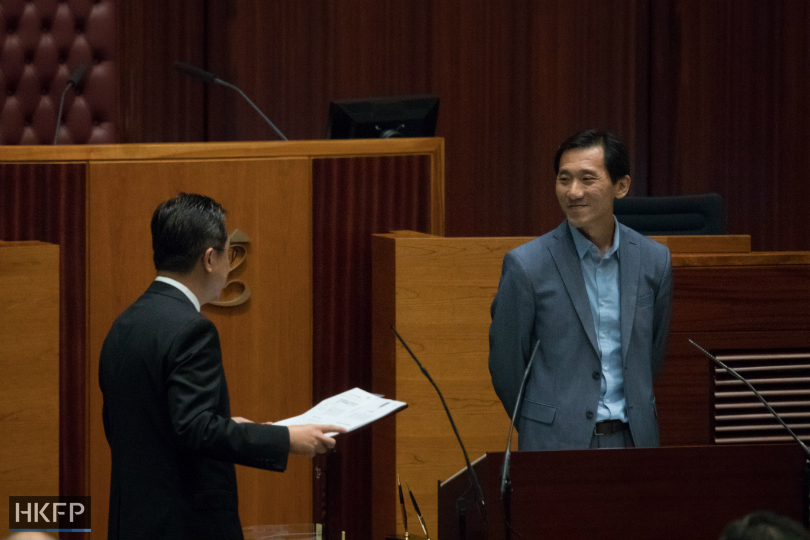Disqualified lawmaker Edward Yiu has said he may consider running for direct election, should he join the upcoming by-elections.
He was disqualified by the court for not taking his oath properly last year. His oath was taken before Beijing issued an interpretation of the Basic Law, Hong Kong’s de facto constitution, stipulating that lawmakers must take their oaths solemnly and accurately. Yiu was one of six lawmakers who were disqualified.

Yiu won a seat in the architectural sector of the functional constituency – where the pro-Beijing camp has an overwhelming majority. Even if Yiu regains his seat, he would not be able to retain the veto power for the pro-democracy camp in the geographical constituency, in which lawmakers are chosen by direct elections. About 3.8 million voters elect 35 lawmakers in the geographical constituencies, while about 240,000 voters in different sectors elect the same number in the functional constituencies.
Yiu said his options include appealing the case, running in his sector’s by-election, or running in a geographical constituency.
“We need to discuss to see if there are better choices. Our goal is to win as many seats as we can,” he said on a Commercial Radio programme on Monday.
Other than Yiu’s seat, there is one vacant seat in Hong Kong Island constituency, and two each in the New Territories East and Kowloon West constituencies.
The democrats are concerned that, should all by-elections be held at once, it is likely they would lose at least two seats in the latter two constituencies, since they would need an extremely high number of votes to win all four seats.

“We have not discussed [strategy] yet,” Yiu said. He added that since the cases of the four recently disqualified lawmakers were very similar, it may be enough if just one of them applies for appeal.
Asked if he was worried that the government’s returning officers may ban him from running again using a controversial “confirmation form” – which demands that contenders pledge to uphold the Basic Law – Yiu said he believed he has a high chance of passing the test.
Professionalism
Before becoming a lawmaker, Yiu was an associate professor in geography at the Chinese University of Hong Kong.
Yiu said that in his nine months as a lawmaker, he successfully revealed the governments’ “inaccuracies and cover-ups” in cases such as the Wang Chau housing development controversy, the Kai Tak Sports Park development model, and the cost of the MTR’s Sha Tin to Central Link.
Edward Yiu said he felt that his time in the legislature was worthwhile, as he had demonstrated a new way of reviewing policies using academic methods.

He said that, in a legislature dominated by the pro-Beijing camp, an opposition lawmaker’s job is to monitor the government. “The government can forcefully pass any projects… My job is to reveal the evil within, the cover-up.”
“I have demonstrated this new way of reviewing policies – I don’t feel that [the disqualification] was a pity,” he said.
He added that a lawmaker’s job was different from that of a scholar, as legislators needed to actively monitor the government, and the government in turn was obliged to respond: “The government could just ignore me when I was a scholar.”
During his oath taking, Yiu added the phrase “for democracy and for Hong Kong’s sustainable development.”
“When I took the oath – you can say it was unintentional – I revealed the evilness of the [Basic Law] interpretation, showed the injustice of that law, and told the international world that the government can retroactively overturn yesterday’s oath using tomorrow’s interpretation.”
